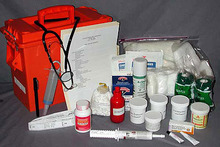An emergency and the need for first aid are exactly what the words imply: something potentially disastrous has happened that requires immediate temporary medical attention until the veterinarian can get there, or until a sick orinjured horse can be transported to the clinic.
As horse owners, we are urged to make sure we have first aid kits available for these emergencies. Unfortunately, given such busy lives, many equine owners have the same items in their first aid kits year after year and during all kinds of hot and cold weather.
If the items in first aid kits are not replenished and rotated, exposure to the heat of summer and the cold of winter can shorten the shelf life of these supplies.
Separation or discoloration of ointments can be a sign of damage caused by summer heat or freezing cold winter weather. Hot temperatures or extreme cold can trigger the breakdown of chemicals in liquid injectables and supplement products, rendering them ineffective and, in some cases, harmful.
Signs of temperature-related damage include separation, off odor and discoloration especially in ointments, salves, gels and creams. Some medications may not appear to be damaged, but many lose their effectiveness over a period of time and when stored where they are unprotected from extreme temperatures.
If possible, make it a habit to keep medications in your house or a climate-controlled room. Storing first aid kits in an insulated chest will protect them in most instances, whether in the home, barn or when traveling in in a truck or trailer.
With winter weather here, medications and ointments may accidently freeze and its difficult to determine whether they are still safe to use. Either replace them or ask your veterinarian about whether or not they are still useable.
It's recommended that equine owners update first aid supplies twice a year. A good rule of thumb is to refresh them when you change your clocks for daylight savings time, or when you check smoke detector batteries.

